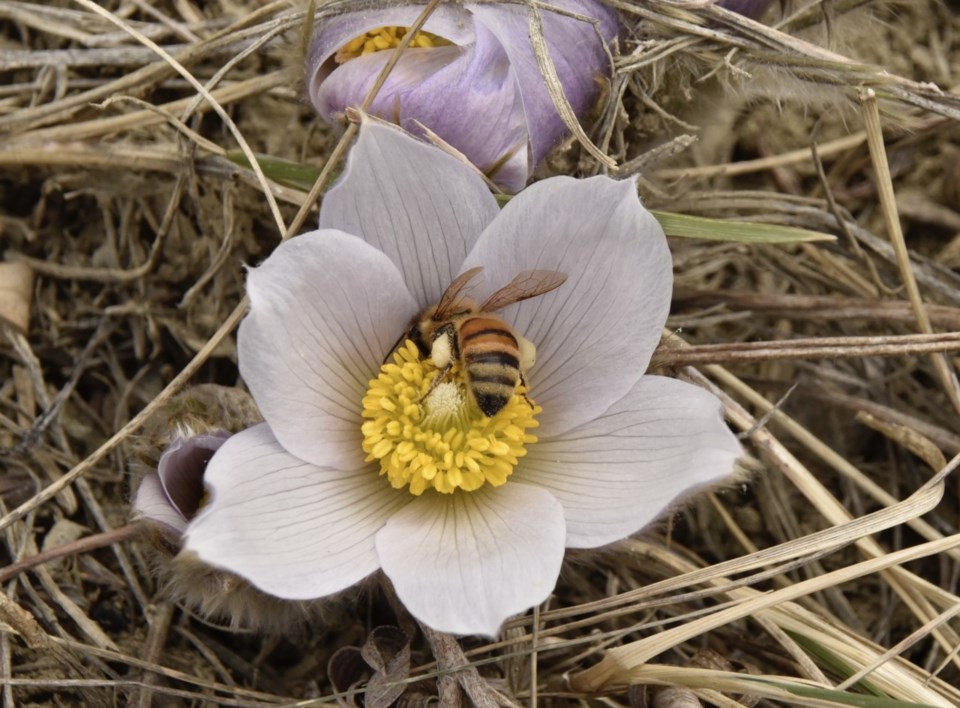Cochranites with an interest in bees who are also looking for a fun outdoor activity for the kids this spring and summer will have the opportunity to take part in important research at the same time starting next month at the Glenbow Ranch Provincial Park.
No special knowledge or skill sets are required to become a “Bumblebee Community Scientist” – just an interest in bees and nature.
Putting it another way, it will be a walk in the park.
In conjunction with Wildlife Preservation Canada (WPC), the Glenbow Ranch Park Foundation (GRPF), which overseas the provincial park located near Cochrane, is offering a pollinator program this year aimed at monitoring of bumblebee populations.
In addition to gathering data on the numbers and species of particular bumblebees, volunteers will also gather data on which types of plants and flowers are being pollinated.
Blake Weis, GRPF’s conservation program coordinator, said the park will be welcoming groups of volunteers who go out and sample the bumblebees with nets and cameras.
“The photographs are sent to experts for identification confirmation, so we can see whether certain species are increasing or decreasing,” he said.
Volunteers will be assigned specific areas to sample. The bees are captured, photographed, and then released.
The workshops, which begin in June, will involve about a half-day of walking.
To become what the foundation is calling a “Bumblebee Community Scientist,” interested volunteers can go to the Glenbow Ranch Park Foundation website, grpf.ca, to open an account and then sign up for the workshops.
The volunteer training workshop is scheduled for June 10 and the first workshop will be on June 12.
Participants will learn how the yellow-banded bumble bee (Bombus terricola), the rusty-patched bumble bee (Bombus affinis), and the western bumble bee (Bombus occidentalis) were all once some of the most common bumble bee species within their ranges in Canada.
According to WPC, all three species are closely related – they belong to the same sub-genus Bombus sensu stricto. Their numbers have all been declining rapidly since the mid-1990s. All three species have been assessed by the Committee on the Status of Endangered Wildlife in Canada (COSEWIC) to be in decline.
In 2010, the rusty-patched bumble bee was assessed as endangered; in 2014, the western bumble bee subspecies occidentalis was assessed as threatened; and in 2015, the yellow-banded bumble bee was assessed as being of special concern.
Weis said there are certain species of bumble bees that environmentalists are especially interested in – and two of the three are residents of the park.
“There are a couple of bee species at risk in the park – the yellow banded bumble bee, and the western bumble bee,” he said.
GRPF has participated in the citizen science pollinator program for the last three years.
Since WPC launched the Native Pollinator Initiative’s Bumble Bee Recovery program in 2013, they have collaborated with numerous partners internationally to develop and maintain a variety of native pollinator conservation projects.
Some of those projects include a conservation breeding program for the yellow-banded bumble bee, biodiversity monitoring, the Bumble Bee Watch community science database, and targeted community science training programs.
They promote public educational workshops and have piloted the use of artificial colony nest boxes as a conservation tool.
Though many of WPC’s bumble bee recovery programs are based in Ontario, since 2016 they have been building relationships and expanding programs into Alberta as well, with the goal of working with the western bumble bee in the future once they have developed reliable techniques for bee conservation interventions.
Also at Glenbow Ranch Provincial Park, bird-watching tours are still available for bookings until May 30.
The GRPF is a not-for-profit organization dedicated to the protection and preservation of Glenbow Ranch Provincial Park and other lands that possess important heritage and ecological value. Established in 2007 by the Harvie family, the mission is to protect and promote the park through engagement, education, collaboration and conservation.




